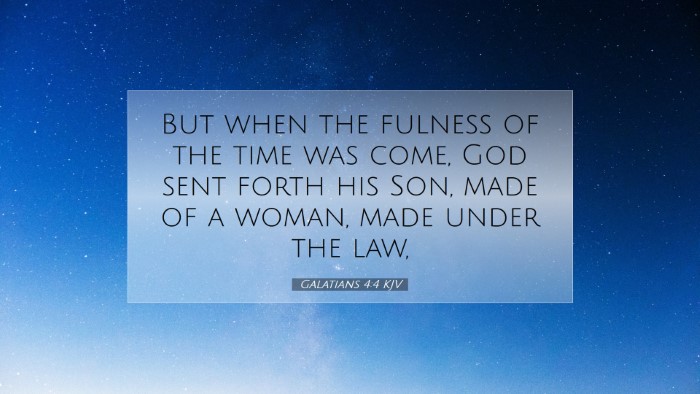Commentary on Galatians 4:4
Verse: "But when the fullness of time had come, God sent forth His Son, born of a woman, born under the law."
Introduction
Galatians 4:4 encapsulates a pivotal moment in Christian theology, marking the incarnation of Christ and the fulfillment of God’s redemptive plan. This commentary synthesizes insights from renowned public domain commentaries, offering a comprehensive analysis that serves pastors, students, theologians, and Bible scholars.
Theological Significance
This verse is critical for understanding the nature of Christ's incarnation and its implications for humanity. The phrase "when the fullness of time had come" indicates that divine timing is perfect, and God operates within history to achieve His purposes.
Fulfillment of Prophecy
Matthew Henry emphasizes that the incarnation of Christ was the culmination of centuries of prophecy and expectation. The "fullness of time" signifies that all conditions necessary for Christ's coming had been met, aligning with God's sovereign plan established before the foundation of the world.
The Role of the Law
Albert Barnes expounds on the significance of "born under the law." This phrase highlights that Jesus voluntarily subjected Himself to the Mosaic Law to redeem humanity. By doing so, He fulfilled the law's requirements perfectly, which is essential for our salvation.
Christ’s Humanity
Adam Clarke notes the importance of Christ being "born of a woman." This phrase underscores the genuine humanity of Jesus, affirming His complete identification with human nature. It also implies the significance of Mary in the story of salvation, chosen by God to bear the Messiah.
Divine Timing and Sovereignty
The phrase "when the fullness of time had come" speaks volumes about God's sovereignty over human history. God orchestrates events leading up to the incarnation, demonstrating His control over the timeline of redemption.
- Historical Context: The historical backdrop during the time of Christ was ripe for the gospel's spread, with the Roman Empire's roads facilitating travel and communication.
- Spiritual Readiness: Henry also notes the spiritual vacuum and longing for a savior that characterized the Jewish people’s state under Roman rule.
- The Universal Nature of Salvation: The inclusion of Gentiles into the fold of believers further emphasizes God’s design in the timing of Christ's coming.
Christ – The Fulfillment of the Law
In understanding that Christ was "born under the law," it is crucial to recognize His role as both the lawgiver and the one who perfectly fulfilled the law. This duality reveals the depth of His mission.
- Redemption: Christ’s adherence to the law qualifies Him as the perfect sacrifice for sin, offering redemption to those who fail to keep it.
- Empowerment by the Spirit: Through the Holy Spirit, believers are empowered to live in accordance with God's will, a privilege made possible through Christ’s sacrifice.
The Implications of the Incarnation
The incarnation signifies more than theology; it provides a prototype for believers. Jesus' earthly life serves as an example of obedience and reliance on God’s will.
Identity and Purpose
Pastors often highlight that understanding Jesus' identity as both God and man is foundational for believers’ identity in Christ. This dual nature allows Christians to approach God in a personal way, knowing that He understands their struggles.
Conclusion
Galatians 4:4 invites deep contemplation and theological reflection. The verse succinctly conveys God's intentionality in redeeming humanity through the person of Jesus Christ. By being born of a woman and under the law, Jesus meets the requirements for redemption, providing a mechanism through which all may attain salvation.
This commentary, drawing from esteemed biblical scholars, encourages believers to reflect upon the miraculous nature of the incarnation, leading to transformation in understanding, faith, and practice.


